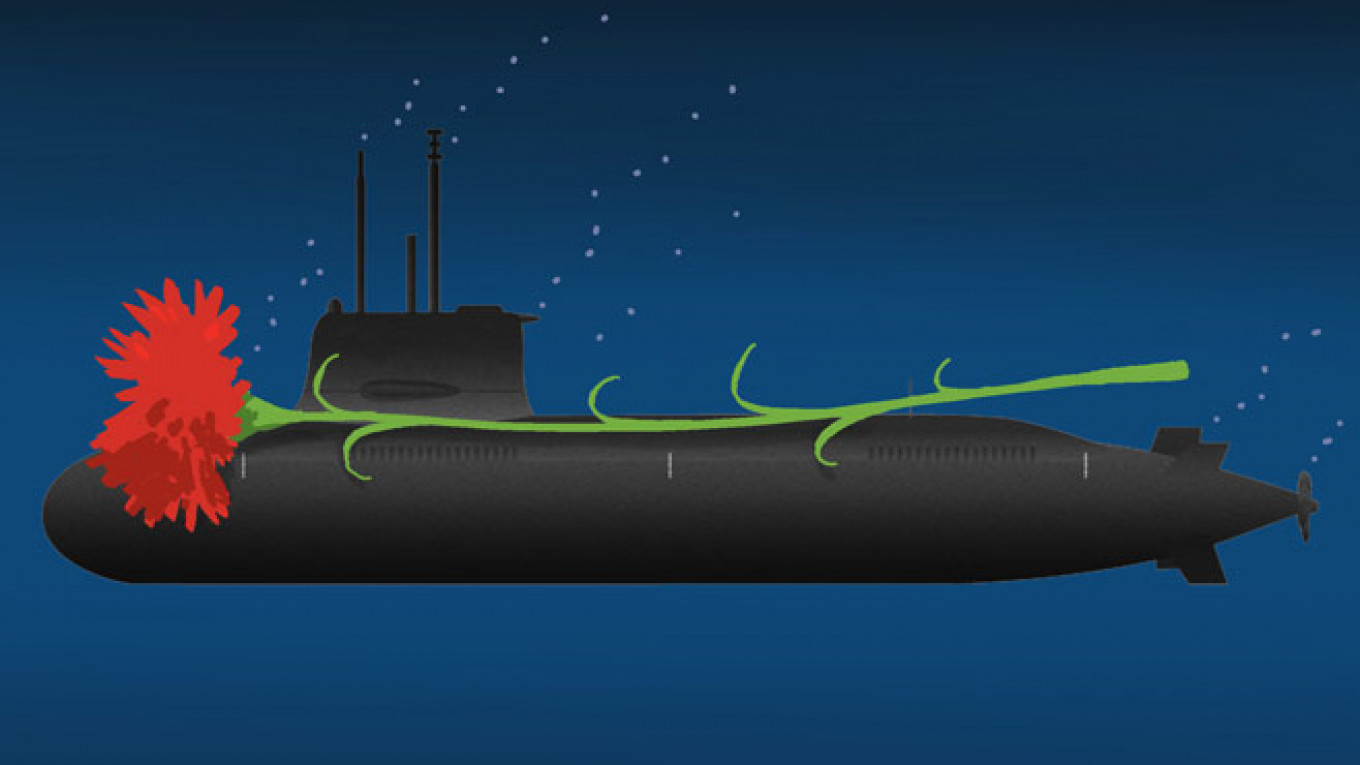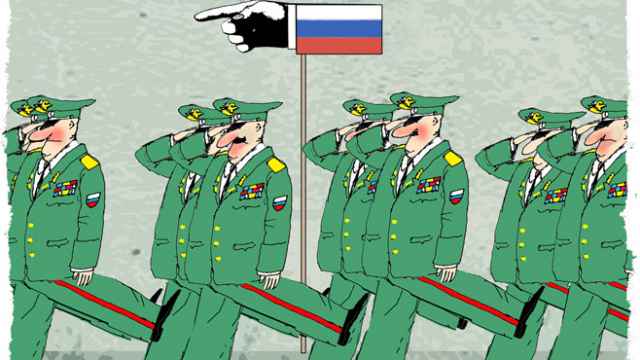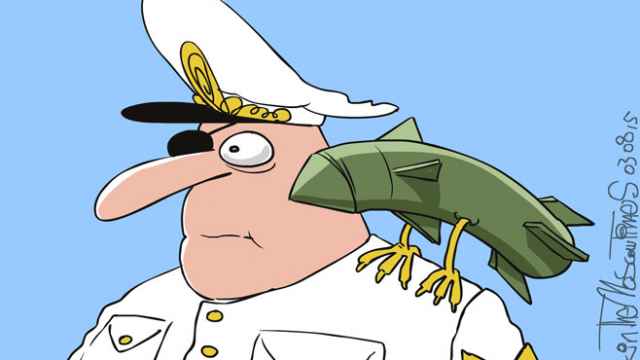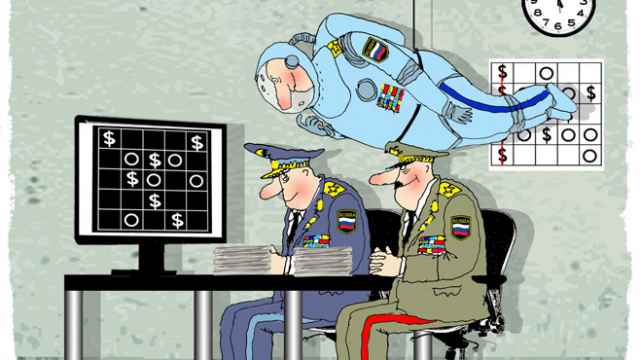Two events coincided last week. The first was the 15-year anniversary of the sinking of the Kursk submarine, which passed with very little fanfare, no speeches from high-profile politicians, and no national television programs. Recognition of the date was limited to events in the cities where crew members are buried, those 21st century martyrs.
How long are we going to talk about it? As President Vladimir Putin told Larry King, it sank, and that was that. Enough with the lamentation. All the more since surveys show the Russian public is now sure that the country's leaders did everything they could to save the men on board the Kursk. Everyone has simply forgotten that those leaders spent several days discussing whether or not to ask for foreign assistance. Putin couldn't have made a mistake.
At the same time, this tragedy is definitely worthy of a serious discussion now. At the very least because it was an important turning point in the evolution of Putin. It showed the truth behind his — to put it mildly — romantic notions of the military's top brass. That was the moment when he learned that even men with many-starred gold epaulettes could still lie straight to his face.
It was no coincidence he put Sergei Ivanov, then one of his closest associates, in charge of the Defense Ministry soon after the Kursk. This was done simply to find out the true state of affairs in the army (I'll note in passing that this attempt was a failure; Ivanov soon became an obedient conduit for the lies of the generals).
It was the Kursk disaster that showed Putin the extent of the rot within the army. After the tragedy, he had a radical military reform plan developed by the Union of Right Forces party on his desk, but didn't take the risk of implementing it then. But a very similar reform was introduced ten years later by Anatoly Serdyukov.
Back then, in 2000, Putin fastidiously ignored the heaps of lies the admirals immediately started feeding him as they attempted to prove that the cause of the tragedy was some NATO submarine, which either collided into the Kursk or torpedoed it. But no follow-up accusations were then directed at the insidious West.
I suspect that everything would look differently were, God forbid, such a disaster to occur today. After all, another event led to much discussion on the Russian news last week — the publication of a report by the European Leadership Network with the revealing title "Preparing for the Worst: Are Russian and NATO Military Exercises Making War in Europe More Likely?"
The authors emphasize obvious factors: the nature of the exercises held by NATO and Russia throughout the previous year indicate that they are developing scenarios for military conflict with the other party. This is demonstrated by the strategic character of the maneuvers: they cover several theaters of military action simultaneously, and include the swift transport and deployment of large numbers of troops. The writers of the report also analyze the "snap exercise" held by Putin's order in March.
According to data from British analysts, more than 80,000 military personnel participated, as well as more than 60 warships and 200 planes. This exercise covered an enormous territory, from the Arctic region to the Crimea, and Kaliningrad to Sakhalin.
NATO exercises have been much more modest thus far. Those who planned them, however, are clearly keeping in mind NATO maneuvers from the era of the previous Cold War. The alliance made innumerable preparations in those days for the transport of 100,000 American soldiers to Europe.
The scale of current maneuvers is so far insignificant, with participants totaling about 15,000. But the scenarios are similar. These are strategic troop transports, the number of which could be increased, and swift deployment in regions under threat.
The same authors noted in their previous report that increased military activity raises the risk of potential incidents in the air and at sea: "Even though direct military confrontation has been avoided so far, the mix of more aggressive Russian posturing and the readiness of Western forces to show resolve increases the risk of unintended escalation and the danger of losing control over events."
So this is the time to ask the question: how would the Kremlin react if the Kursk tragedy were to occur today, during maneuvers when Russian and NATO forces carry out simultaneous war games near each other? Could the president ignore the admirals this time, if they began to confidently lie about an enemy submarine either colliding with or attacking a Russian one?
It's not even a matter of how the propagandists would react. Rather, could Putin himself, the person who has the right and capacity to press the "red button," withstand the influence of the very military hysteria he has helped to create? If not, the world faces an uncertain future.
European Leaders Network analysts see a path to resolution through the parties concentrating on measures to establish mutual military trust, work on a new treaty on conventional armed forces in Europe (Russia no longer participates in the original CFE treaty), and create emergency contact channels, which could help clarify the situation during a crisis.
This is a rational approach. But it would mean returning to a Cold War situation. That is, a situation in which the focus is on the military force and means of the conflicting states, and questions about the soundness of their leaders become secondary.
Alexander Golts is deputy editor of the online newspaper Yezhednevny Zhurnal.
A Message from The Moscow Times:
Dear readers,
We are facing unprecedented challenges. Russia's Prosecutor General's Office has designated The Moscow Times as an "undesirable" organization, criminalizing our work and putting our staff at risk of prosecution. This follows our earlier unjust labeling as a "foreign agent."
These actions are direct attempts to silence independent journalism in Russia. The authorities claim our work "discredits the decisions of the Russian leadership." We see things differently: we strive to provide accurate, unbiased reporting on Russia.
We, the journalists of The Moscow Times, refuse to be silenced. But to continue our work, we need your help.
Your support, no matter how small, makes a world of difference. If you can, please support us monthly starting from just $2. It's quick to set up, and every contribution makes a significant impact.
By supporting The Moscow Times, you're defending open, independent journalism in the face of repression. Thank you for standing with us.
Remind me later.







